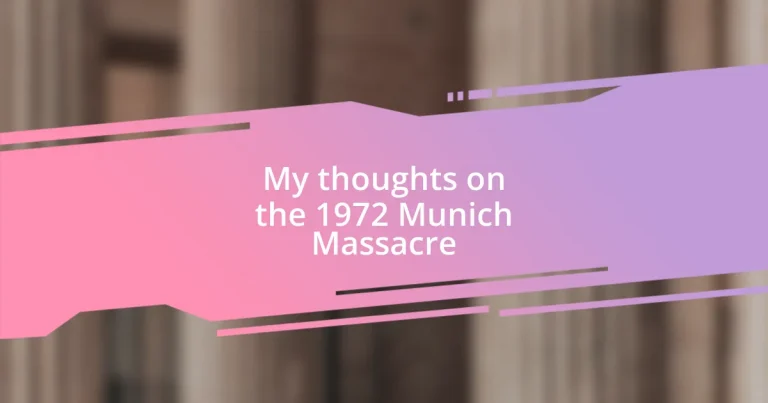Key takeaways:
- The 1972 Munich Massacre involved the Palestinian group Black September taking eleven Israeli athletes hostage during the Olympics, leading to their tragic deaths and a profound impact on international security measures.
- The incident emphasized the need for enhanced security protocols at major events, transforming how authorities approach safety and crisis management in sports.
- The aftermath sparked global discussions on terrorism and international relations, highlighting the balance between seeking justice and promoting peace in response to violence.
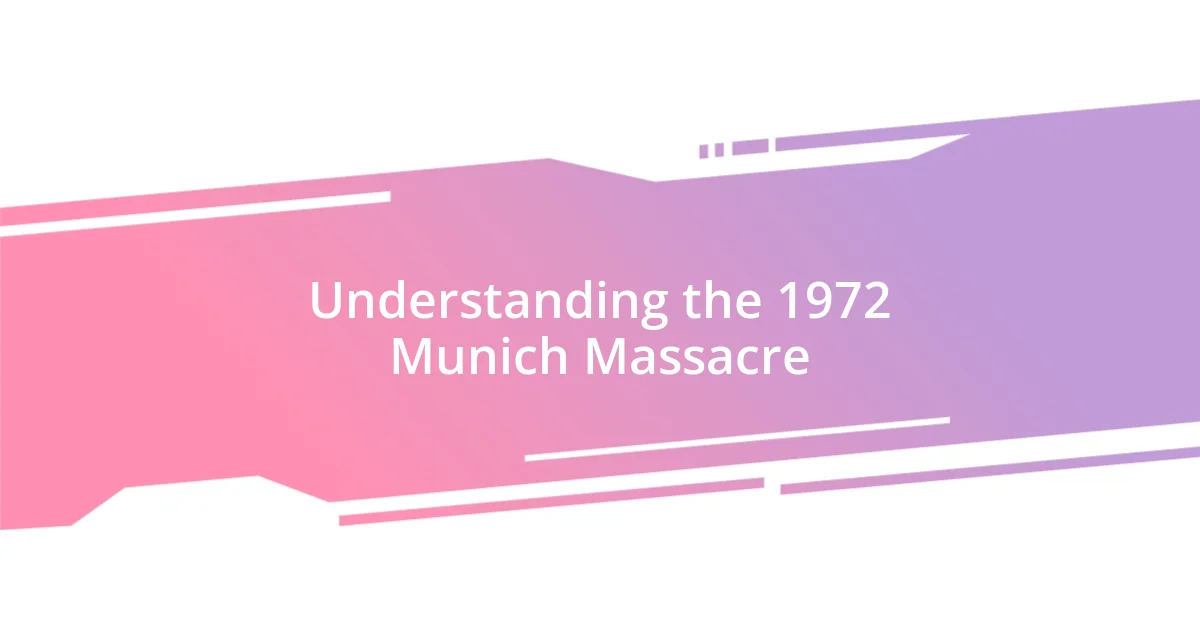
Understanding the 1972 Munich Massacre
The 1972 Munich Massacre, a tragic event that unfolded during the Summer Olympics, shook the world to its core. I remember discussing it with my family years later, and the pain on my grandfather’s face was palpable. He recounted how, at the time, it felt surreal that a celebration of peace and unity could be marred by such violence.
Understanding why this happened requires delving into a complex web of politically charged tensions. The Israeli athletes were targeted by the Palestinian group Black September, driven by a deep-seated desire to vocalize their struggles. Isn’t it distressing to think that those games, meant to foster friendship and sportsmanship, became a stage for such horrifying acts?
The aftermath left a lingering impact, shaping the conversation around security at international events. I often wonder how different those games would have been if there had been a more robust security presence. It’s a haunting reminder of how quickly innocence can be shattered, leaving a scar on what should have been a moment of glory for athletes worldwide.
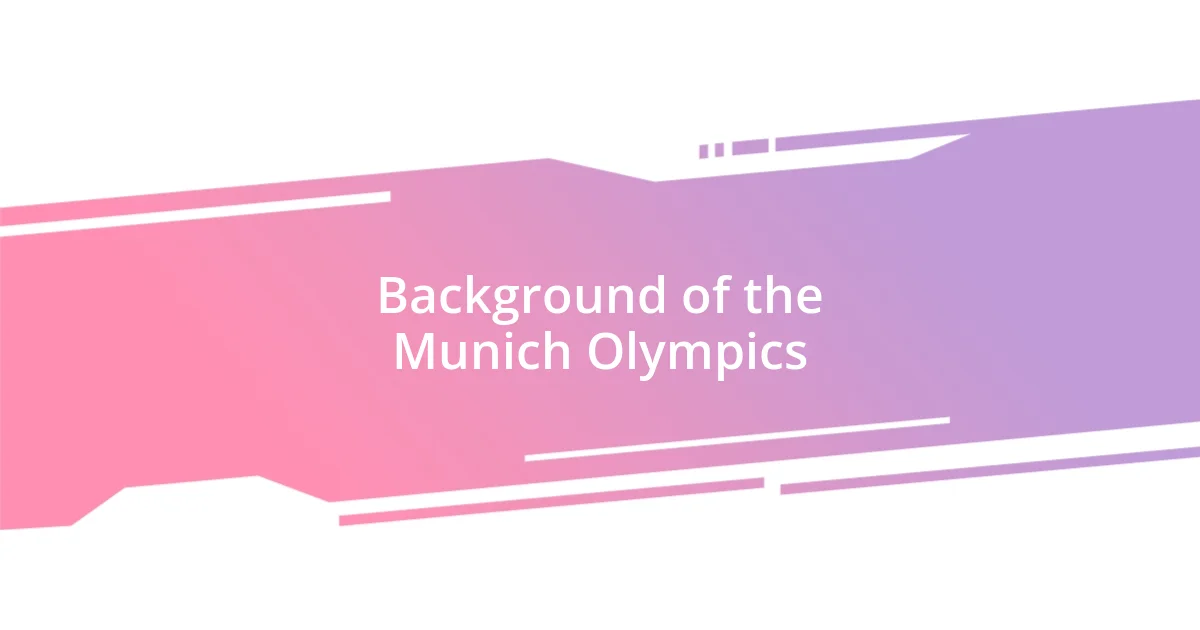
Background of the Munich Olympics
The Munich Olympics of 1972 were incredibly significant, representing a moment of optimism for Germany and the world after the turmoil of World War II. I often think about the palpable excitement surrounding the games, as people from various nations came together to celebrate unity through sport. It was advertised as the “Happy Games,” symbolizing peace and progress, but the atmosphere was charged with underlying political tensions that many seemed eager to overlook.
- The games were held from August 26 to September 11, 1972.
- Nearly 7,000 athletes from 121 countries participated.
- For the first time, the Olympics featured athletes from East and West Germany competing together.
- The event aimed to showcase a new, reinvigorated Germany, far removed from its past.
- The Olympic Village was designed to promote interaction and camaraderie among athletes.
Despite the excitement, I can’t help but think about the shadows that lingered in the background. My fond recollections of sharing stories with friends about athletes’ remarkable skills often clash with the somber reality of what unfolded during those fateful days. This juxtaposition of joy and tragedy highlights just how thin the line can be between celebration and sorrow.

Events of September 5 1972
The morning of September 5, 1972, began like any other during the Munich Olympics, filled with anticipation and excitement. I can almost imagine the atmosphere buzzing with energy, as athletes prepared for their day’s competitions. However, what unfolded that morning was horrific. Members of the Palestinian terrorist group Black September infiltrated the Olympic Village, taking eleven Israeli athletes hostage. The contrast between the vibrant Olympic spirit and the cold reality of the hostage situation was chilling.
As the day progressed, negotiations took center stage, and I remember reading about the tense interactions and demands put forth by the terrorists. They wanted the release of Palestinian prisoners held in Israel. One can only imagine the feelings of dread experienced by the hostages and their families during those endless hours of uncertainty. How could a moment intended for peace devolve into chaos? This is a poignant reminder of the fragile nature of safety, especially in places designed to celebrate unity.
By late evening, the standoff escalated disastrously when a rescue attempt by West German police went wrong at the Fürstenfeldbruck airbase. Tragically, all eleven hostages were killed, leaving an indelible mark on the world. The event resonated with me deeply, as I recognize that such violence can invade even the sanctity of an international event, roiling in the depths of my memory as a touchstone for discussions about security and the importance of dialogue in times of crisis.
| Key Events | Details |
|---|---|
| Initial Hostage Taking | Early morning, Black September terrorists breached the Olympic Village, seizing eleven Israeli athletes. |
| Negotiation Attempts | Long negotiations ensued, with terrorists demanding the release of Palestinian prisoners. |
| Failed Rescue Operation | A late-night rescue attempt by police resulted in the tragic death of all hostages. |
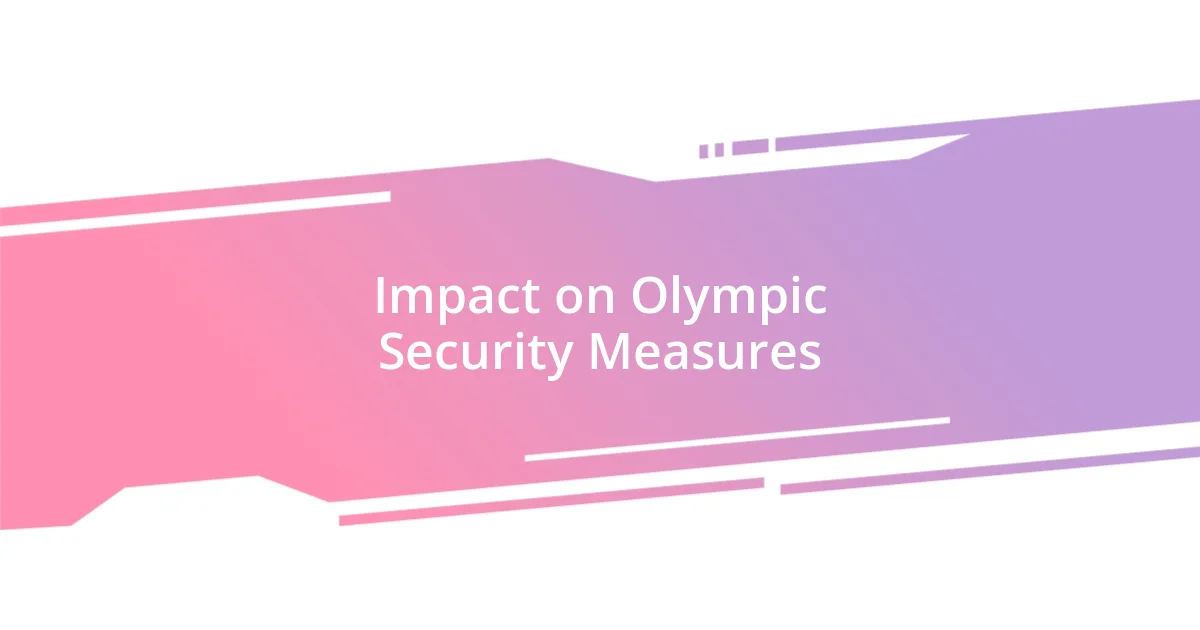
Impact on Olympic Security Measures
In the aftermath of the Munich Massacre, the face of Olympic security was forever altered. I often think about how, before Munich, security measures were more focused on logistics than on safeguarding participants from potential threats. The shocking realization that such violence could infiltrate a celebration of peace forced organizations to rethink their approach entirely.
As a result, enhanced security protocols became standard for future Olympic Games. I remember discussing with friends the lengths that authorities now go to, like background checks and surveillance systems, which we might take for granted today. It’s sobering to consider that these measures stemmed from a deep collective desire to prevent further tragedy. Would the Games feel different if we realized that athletes now compete under the weight of rigorous security in the name of their safety?
Over the years, I’ve come to appreciate how the events at Munich reshaped not just security, but the very essence of the Olympics themselves. The increased presence of law enforcement and screening processes may enhance safety, but they also remind us of the fragile balance between celebration and vulnerability. I can’t help but wonder: can we ever achieve that spirit of unity and openness again, or will the shadow of past tragedies continue to linger like a protective barrier around future games?
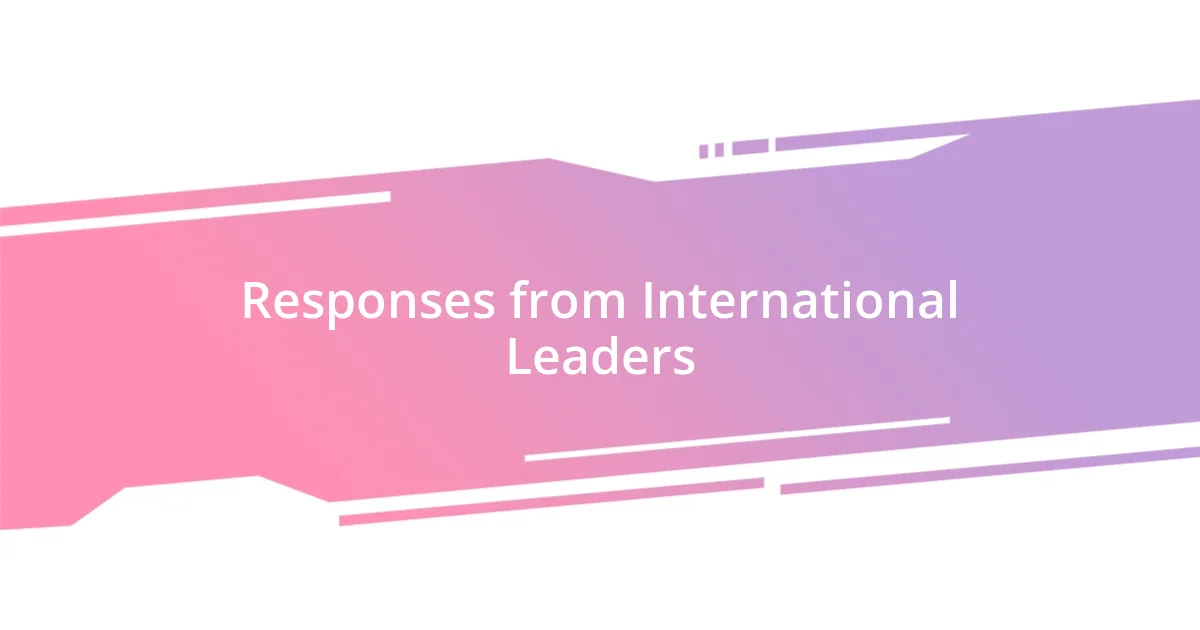
Responses from International Leaders
When international leaders responded to the Munich Massacre, their reactions varied widely, reflecting the global tension surrounding the event. Many, myself included, felt a profound sense of grief. I remember thinking about how leaders like then-Israeli Prime Minister Golda Meir expressed anger and heartbreak, emphasizing their commitment to justice and the protection of their citizens. It struck me how personal these responses felt, as if every nation was grappling not just with the loss but with the implications of such brutality.
On the other hand, some leaders called for calm and restraint, urging the world to seek resolution rather than revenge. I recall reading United Nations reactions that emphasized dialogue and peace, trying to promote a narrative that violence begets violence. This perspective resonates with me deeply; it raises the question of how we can balance the pursuit of justice with the need for healing and understanding in an already fractured world. Did they fear further escalation?
As time went on, the incident sparked broader discussions about international terrorism and global security. It’s fascinating—and a little unsettling—to see how the ramifications of that day swayed diplomatic relationships and security policies. What unfolded in Munich set a precedent I still find relevant: how should world leaders confront the rising tide of extremism? To me, the challenge remains: ensuring safety while fostering a climate of trust and collaboration among nations.
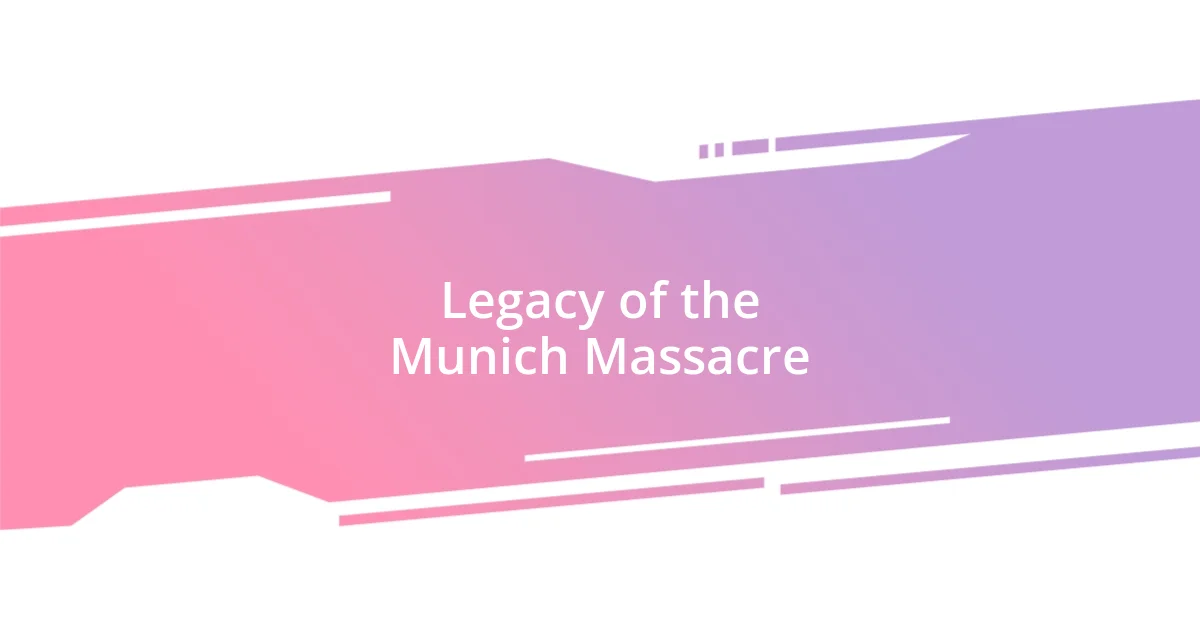
Legacy of the Munich Massacre
The legacy of the Munich Massacre extends beyond immediate security changes; it also sparked a transformation in the way we view international sports. I vividly recall reflecting on how the event altered our collective perception of the Olympics—not just as a celebration of athletic prowess but as a potential stage for political violence. This shift in mindset makes me wonder how we reconcile the ideals of peace and unity with the stark reality of conflict intruding even on our most cherished global gatherings.
Moreover, the Munich Massacre has had a profound influence on the way nations approach counterterrorism. I’ve often found myself thinking about how countries adopted tighter measures in their own borders, and how this created a ripple effect on domestic policies and international relations. It’s astounding to consider that a single event could prompt leaders to redefine their strategies on national security, raising the stakes for how we protect not only major events but everyday life, too.
Finally, from my perspective, the emotional scars left by Munich compel ongoing conversations around resilience and remembrance. During discussions with friends or at community commemorations, I’ve realized that as long as we remember the tragedy, we also honor the victims. But this raises a crucial question for me: How do we ensure that remembrance doesn’t just lead to fear, but instead inspires collective action towards a more secure and understanding world? We grapple with the need for vigilance while yearning for a peaceful, inclusive future—an intricate dance that’s become a part of our societal fabric.

Lessons Learned for Future Events
The Munich Massacre taught us the importance of proactive security measures at international events. I remember attending a large sporting event myself and feeling a sense of unease due to heightened security protocols put in place after various incidents. This forced me to think about how often we blur the line between safety and the enjoyment of gatherings. How do we strike that balance? It’s a dance we continually navigate.
One critical lesson learned is the necessity for better cooperation among nations to tackle threats of terrorism. Reflecting on my own experiences, I’ve witnessed how shared intelligence and resources can lead to more effective prevention strategies. It seems almost indispensable now; do we really want to face another tragedy because we hesitated to work together? It’s a question that lingers in my mind.
Additionally, the emotional fallout from such events underscores the need for thorough crisis management training for event organizers and security personnel. I recall learning about how the stress and chaos of that day left a deep impact on not just families but responders too. This prompts me to ask: How prepared are we when faced with the unthinkable? Ensuring that systems are in place to handle panic, grief, and public safety is a critical lesson we must embrace moving forward.












